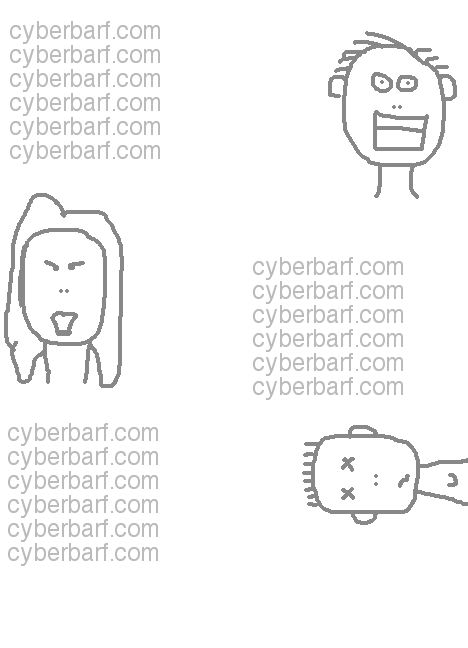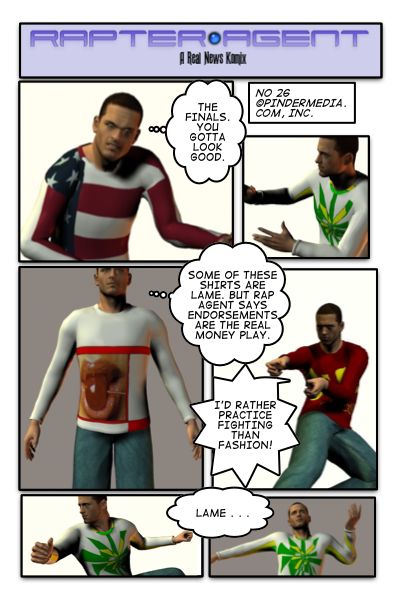 |
FROM THE VIRTUAL CYBERPRINTING CENTER IN THIS ISSUE HUFF & PUFF EGGNOGERRATION MACINTOSH AT 25 iTOONS REAL NEWS KOMIX WHETHER REPORT
|
 |
FROM THE VIRTUAL CYBERPRINTING CENTER IN THIS ISSUE HUFF & PUFF EGGNOGERRATION MACINTOSH AT 25 iTOONS REAL NEWS KOMIX WHETHER REPORT
|
February, 2009 Vol. 8 No. 7 |
| cyberbarf8.7 |
EXAMINE
THE NET WAY OF LIFE
|
HUFF & PUFF MEDIA WATCH
The demise of traditional media is both sudden and alarming: the layoffs in all aspects of journalism, the media bankruptcies and the closing of community newspapers is accelerating at an unprecedented pace. The Chicago Tribune and the Minneapolis Star-Tribune are both in bankruptcy court trying to restructure their business operations under the crushing load of corporate debt and bad management decisions.
Newspapers, magazines, and broadcasters are all lamenting the crushing advertising drought of 2008-2009. The good times were fueled by skyrocketing home prices, cheap mortgages and fat advertising sections for ancillary goods and services that the booming construction economy was providing the nation. But instead of understanding the house of cards, traditional media was caught up in the leverage tidal wave and used their conservative balance sheets as the fuel to merge, acquire and overpay for nontraditional assets. Burdensome debt was the gasoline used to burn down the house of cards when the paper economy blew up in September, 2008.
There was a preamble to the shambles of the present media landscape. That little thing called the internet made napkin business plan millionaires in the paper economy of venture capitalism. It did not matter whether the business actually had a viable plan, or that the enterprise would ever make a profit: the culture was to get in on the ground floor, and exit when the idea's excitement hit its peak. But in the wild west frontier, business ethics took a back seat to greed. Greed and easy money soon permeated the culture of the Internet, a revolutionary medium that the average person today still does not understand.
The traditional media wrapped itself in the rocket of the era. It used to print telephone book thick monthly technology and tech business magazines, filled with slick high gloss advertisements from new companies with the shelf life of grapes. But the stock market was printing free money faster than anyone cared to question. The federal government was printing money in the form of mortgages faster than anyone thought to question. And the financial whizkids on Wall Street decided that they could create their own money by issuing pure gambling speculation devices which no one understood called derivatives. In this mosh-pit of newly created securities, the idea was to sell your hot potato paper as fast as you created more hot potatoes.
No one saw the day when the investment banks were called to pay their massive paper guarantees on the house of cards economy they helped to create; in less than three months the financial and credit crisis was front page bad news that plunged the world into a global recession. A recession which has frozen industry's ability to manufacturer goods and products on credit; import-exporters ability to fund international trade shipments through letters of credit; and created a fear of total collapse in the banking system. In response, the U.S. Congress and the U.S.Treasury have thrown more than $9 trillion in cash and guarantees to allegedly prop up the banking system by the end of 2008. And nothing has changed. Except that the country of Iceland went bankrupt, the United Kingdom's banking system is about to be nationalized in lieu of collapse, and the new American administration is planning to move full speed ahead on massive government spending programs and socializing most of the remaining private sector economy.
This would have been heady days for newspapers and magazines. The potential collapse of the financial industry, the fraud, corruption, the inane political spin, and the stupidity of elected leadership should be able to churn out award winning journalism stories on a daily basis. But it has not happened. Because the newspaper conglomerates were caught in the same vortex of the financial firms because their management held journalism as a secondary concern to the concepts of highly specialized corporate finance arrangements which have led them to the brink of liquidation and extinction.
Another problem facing traditional media is that the Internet culture has become mainstream in its view that information, all information, should be free for the taking. A society that does not value property rights is doomed to lose its freedom to centralized controlled poverty. Compounding the problem is that American industry was outsourced overseas to find cheaper labor for short term profits for management. The American economic base turned to be more service oriented than actual manufacturing, and as a result, people like those in Wall Street created new paper instruments to be sold whether or not those securities or contracts actually meant anything. American consumers, the backbone of the economy, have become dependent on second and third world countries for all their basic needs, including food, and clothing. When the housing boom busted, there were no blue collar and white collar middle class jobs in the industrial sector because most of those jobs no longer remain inside the nation's borders. A recession will turn into a depression if there is not sufficient real private sector jobs for the displaced work force. But the reaction by corporate management has been to layoff or terminate tens of thousands of workers on a monthly basis. The problem is feeding upon itself. Things will get worse unless the the public mindset toward traditional American enterprise principles returns.
Newspapers, magazines and broadcasters that have cut back on staff have also cut back on news stories and reports. When one picks up a local paper today, it is hardly worth the paper the words are printed on: there is no compelling local news! The police and fire reports are more than a week old. The paper rarely covers the local town, school or local board meetings . . . so there is no investigative reporting on what government is doing with the massive amount of tax dollars being spent and that will be spent in the name of federal, state and local crisis deficit spending. People are scared of losing everything that they have spent their lifetimes working for; and the institution of journalism is not in a position to hold back the Huns from ransacking the last virtues of the American way of life, including recklessly spending every dime of savings of every man, woman and child for the next four generations.
Some have cried that the horse has already left the burning barn. But that does not seem to justify others from throwing more tinder on the out of control barn fire. The “new media” web sites have touted themselves as the savior of journalism. But sites like the Huffington Post, which does not pay its reporters, writers or bloggers, has been accused of stealing (not just linking but cutting and pasting copyrighted articles on its pages) other media content. But some writers volunteer to produce the site. How would one justify contributing to a for-profit enterprise by giving away your creative work and craft for nothing? Some do it as a hobby, some because they are unemployed, some want to get their name recognized but none of them realize that this a new digital sweatshop. How can the profession of journalism survive if not only the information is believed to be free and the producers of content will not get paid for their work?
REAL NEWS KOMIX
 |
 |
EGGNOGGERATION THE INTERNET PRESIDENCY
January 20, 2009 goes down as a historic day in American lore by the instantaneous historians who flocked to the Capitol for the inauguration of Barack Obama as the first black president of the United States (notwithstanding Bill Clinton's prior claims to this special interest group).
The giddy drunkenness of the cable news commentators attempting to add Moment to the moment was a sickening as day old egg nog simmering in the sun.
The Internet coverage of the Event was mixed at best. Most news sites had their BREAKING NEWS banner updated every quarter hour with a snippet of what was going on . . . but the three major networks Live web feeds were poor at best. It may be a symptom of the bad economic times, that resources were diverted to the broadcast channels.
The lesson from the election was that Obama's base supporters were the Internet masses who organized, planned and executed the tech savvy game plan to victory. The only web site we found that did the event right was CNN's web coverage. A full screen, clear picture, raw feed of the Event without the annoying booth commentary was the best coverage of the day. Keep the cluttered screen graphics, instant analysis and droning wheezing of how big the crowds are to the ceremonial DVD re-sales that were on sale faster than booze through a Washington lobbyist.
One would have thought the Internet would have been a bigger platform for the inauguration. But in general, it was a disappointing day even though there was a record number of Internet users when the inauguration speech began.
iToon
MACINTOSH AT 25 MILESTONE
Macworld has an excellent recap of the history of the Macintosh computer, which turned 25 years old last month. The fine folks there review the highs and lows of Apple Computer's humble beginnings to its stellar rise as the personal computer and industrial design icon of today.
The homestead is filled with my personal history of this brand. There is a Macintosh Plus and SE located in the loft library. The Plus was the first personal computer that I purchased; when it arrived at the office, people marveled at the dot-matrix printer output. It was such a difference from the beastly control-command heavy C/PM, M/PM Xerox workstation that was coupled with a modified typewriter-printer.
Every decade or so, I fire up one of those machines, and they chime to life without an issue.
When Apple made its first notebook computer, the PowerBook100, there was a frenzy to purchase them. It was so bad that local computer stores could not meet demand. So enterprising Apple rebels, those who were the early standing army against the IBM-Windows operating systems, had to do a countrywide search to find a supply of these new wonders. I got my machines in Virginia. It was quite a coup. Today, there are two newer versions of Apple laptops in black canvas briefcases near the front door.
There are also boxed in the bookshelves an original Newton PDA and an original engraved iPod. The Newton was too ahead of its time. The iPod revolutionized the industry in how people consume and purchase their music.
It was not all Apple. The living room houses a PowerComputing Tower, a valid Mac clone, during the short lived era of licensing the operating system to third party vendors. This machine worked well during its tenure as the new machine. But it was quickly replaced when Apple gave us the colorful Bondi iMacs. The homestead has a rarely used green and a heavily used white one (nicknamed Snow White.). Snow White is a PowerPC G3 running both OS9 and OS10.2.6. There are certain legacy software programs that I still use that only run on OS9 so that is why it is still in home use. It is still the main platform to create the pindermedia web sites.
But there is a newer iMac PowerPC G5 running OS 10.4.3 in a spare room. This machine is being used for digital photography, video editing, music, podcast and graphic productions. Many of the high end graphics you see on this zine were created on that machine and teleported into the older web page design software.
As an early adopter of the Apple computer operating systems, every time I have to deal with a Windows machine, I cringe. At work we have one Windows machine, which has a history of crashing, disconnecting itself from the network, or freezing up. I can now see why Windows is a geeky based platform because it means lifetime employment for system administrators and programmers who have to constantly attempt to fix it!
In the two decades plus working with Macintosh computers, there has been only one hard drive crash of consequence. Otherwise, the machines have performed extremely well: stable, easy to use, and easy to upgrade. There used to be times when clients came into the office and remarked that we had Apple computers on the desks. It was an oddity. But today, we don't get those eyebrow raising comments. Macintosh is now part of the mainstream.
iToon
THE WHETHER REPORT STATUS
Question: Whether American people will ever get a full accounting of all of Obama's Internet campaign donors?
* Educated Guess
* Possible
* Probable
* Beyond a Reasonable Doubt
* Doubtful
* Vapor Dream
Question: Whether the iPhone iApp Store will generate more revenue than the iTunes store?
* Educated Guess
* Possible
* Probable
* Beyond a Reasonable Doubt
* Doubtful
* Vapor Dream
Question: Whether blogging will fade away like the podcast mania from a few years ago?
* Educated Guess
* Possible
* Probable
* Beyond a Reasonable Doubt
* Doubtful
* Vapor Dream
cyberbarf
EXAMINE THE NET WAY OF LIFE
Your Interest keeps this Site moving forward.
THANKS FOR SUPPORTING US.
Webmaster Contact
cyberbarf
Distribution ©2001-2009 pindermedia.com, inc.
All Rights Reserved Worldwide.
THIS SITE IS POWERED BY
pindermedia.com, inc.
Wasted Time for Wasted Lives™